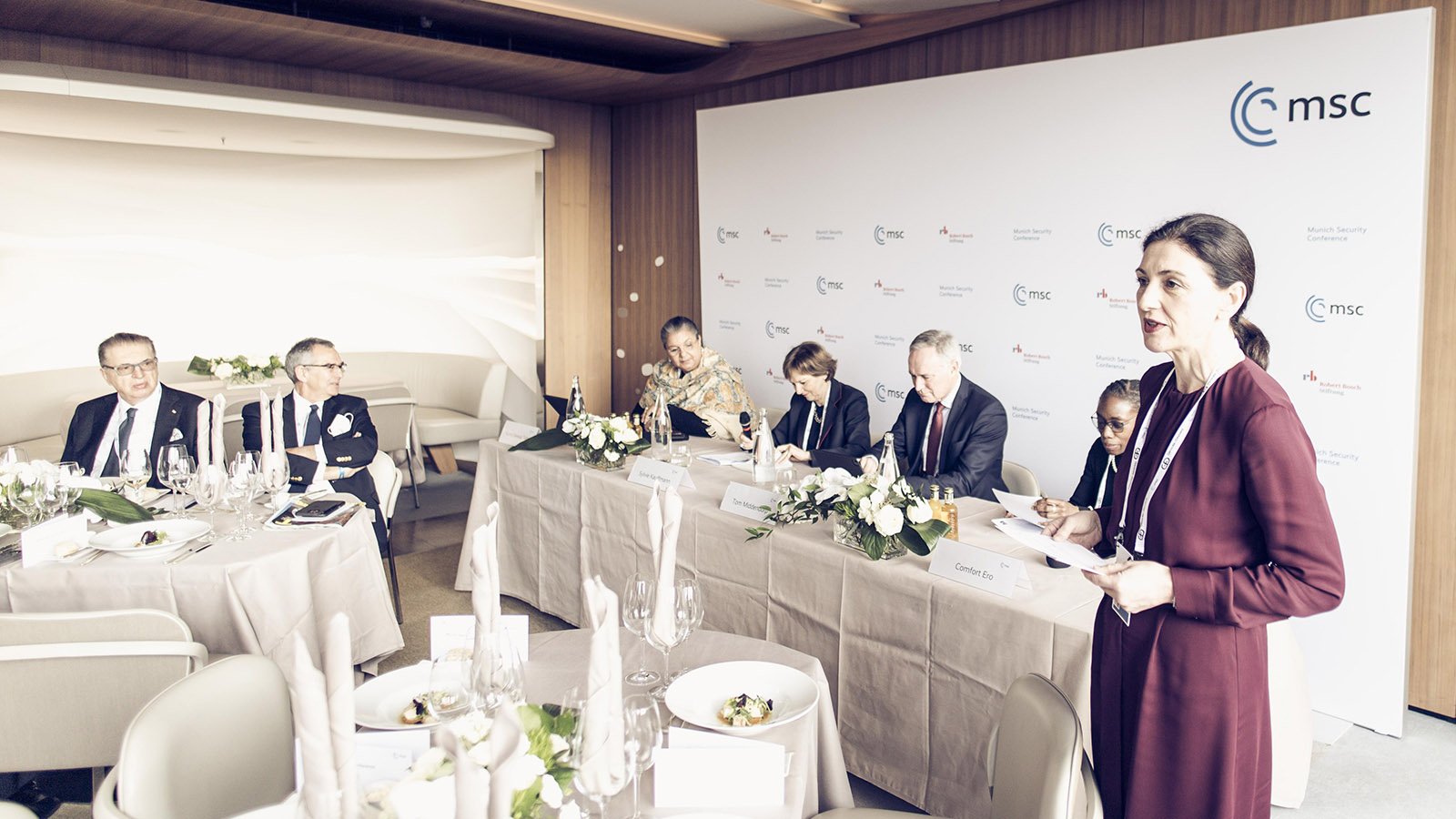“The Sahel Is also a European Challenge”
Ukraine was the all-dominant topic at this year's Munich Security Conference. The Robert Bosch Stiftung deliberately focused on the Sahel region. Stabilization and peacebuilding are currently more necessary than ever before, argues Senior Vice President Atje Drexler in her guest contribution.
The Ukraine crisis or – as Germany’s foreign minister Annalena Baerbock called it – the Russia crisis, took center stage at the Munich Security Conference 2022 and rightly so. Off the main stage, however, speakers urged Europe not to lose sight of another crisis in its proximity while being focused on Ukraine: “The Sahel is also a European challenge” said Hanna Serwaa Tetteh, Special Representative of the UN Secretary General to the African Union on the fringes of the lunch debate “Beyond coups, interventions, and sanctions – What’s next for stabilization and peacebuilding in the Sahel?” hosted by the Robert Bosch Stiftung. She was joined in the debate by Comfort Ero, President and CEO of the International Crisis Group, and General Tom Middendorp, Chair of the International Military Council on Climate and Security.
How can international engagement in the region be more effective?
The political and humanitarian situation in the Sahel region has deteriorated significantly over the last 12 to 18 months. Peaking levels of violence and instability have resulted in unprecedented levels of food insecurity and forced displacement. Borders in the region are particularly prone to high-intensity violence, as a report launched in Munich by the Sahel and West Africa Club (SWAC) at the OECD shows. Two of the G5 Sahel countries – Burkina Faso and Mali – have seen their membership in the African Union and the Economic Community of West African States (ECOWAS) suspended after recent military coups, and ECOWAS has put Mali under sanctions. After President Macrons announcement on Feb 17, 2022 that France is going to withdraw from Mali, other Western nations will reconsider their engagement. Neither sanctions nor outside military interventions have so far yielded results that led to improved human security in the region.
With these two options failing, what else could lead to peace in the Sahel? While the lunch debate certainly did not come up with a comprehensive action plan for the region, panelists and commentators from the audience alike stressed the importance of putting the responsibility for the regions’ development firmly with its own leaders. The crisis in the Sahel must be tackled first and foremost as a crisis of governance, it cannot be solved if it is viewed exclusively through a security lens. Those in power who do not live up to the responsibility they carry for their citizens’ welfare should be challenged by their international partners. At the same time, international partners and regional bodies should continue their support in areas that the Sahel countries are unable to tackle by themselves – from adapting to climate change which is hitting the region particularly hard, to developing educational systems and opportunities to cater for the needs of the most youthful populations in the world and finally to fighting transnational terrorism and organized crime. Last but not least the Sahel states need support in dealing with disinformation campaigns that show clear similarities to the ones Ukraine is faced with and that likely stem from the same source.
Take the time to listen to local peacebuilders
In addition, the Sahel countries’ Western partners should take an honest account of the successes and failures of their interventions so far, before – to quote from the lunch debate – “the international juggernaut moves from Mali, where the Europeans failed, to Niger to fail again in a similar way.” They should also take the time to listen to local peacebuilders, who put their lives on the line every day to improve the security and livelihoods of conflict-affected communities. Their experience and knowledge are too often not taken seriously, and their work is made more difficult by internationals dismissing their input as irrelevant. Including those who are most affected by the insecurity and violence is crucial for any progress towards peace in the Sahel.
Making their voices heard and count and supporting their work on the ground are key elements of the Foundation’s strategy on locally-led peace-building. It is very unfortunate that this years’ restrictions on travel and attendance prevented Sahelians from participating in the debates about their countries at the MSC 2022. We should make sure that they make it to the main stage next time.
The Robert Bosch Stiftung has been a strategic partner of the Munich Security Conference since 2016 and has also supported the International Crisis Group for many years. The Foundation's side event at MSC 2022 was attended by two Richard von Weizsäcker Fellows of the Robert Bosch Academy: Hanna Serwaa Tetteh, the UN Secretary-General's new Special Envoy for the Horn of Africa and former Foreign Minister of Ghana, and Sylvie Kauffmann, Editorial Director at Le Monde. She will begin her fellowship in Berlin in May 2022.
The Robert Bosch Stiftung supports societies affected by violent conflicts in their transformation toward sustainable peace. Local stakeholders who are highly familiar with the conflict and the region design their peace processes.

